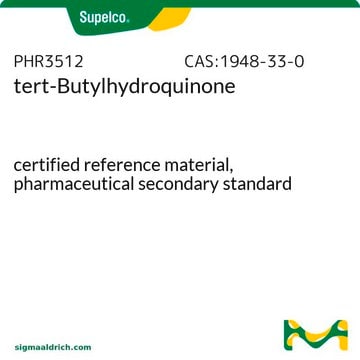PHR1304
Butylated hydroxyanisole
Pharmaceutical Secondary Standard; Certified Reference Material
Sinónimos:
2(3)-t-Butyl-4-hydroxyanisole, 2(3)-t-Butylhydroquinone monomethyl ether, BHA
About This Item
Productos recomendados
grade
certified reference material
pharmaceutical secondary standard
Quality Level
agency
traceable to Ph. Eur. B1212000
traceable to USP 1083008
vapor density
6.2 (vs air)
API family
butylhydroxyanisole
CofA
current certificate can be downloaded
autoignition temp.
599 °F
technique(s)
HPLC: suitable
gas chromatography (GC): suitable
mp
58-60 °C (lit.)
application(s)
pharmaceutical (small molecule)
format
neat
storage temp.
2-30°C
InChI
1S/C11H16O2/c1-11(2,3)9-7-8(13-4)5-6-10(9)12/h5-7,12H,1-4H3
InChI key
MRBKEAMVRSLQPH-UHFFFAOYSA-N
¿Está buscando productos similares? Visita Guía de comparación de productos
General description
Application
Analysis Note
Other Notes
Footnote
related product
hcodes
pcodes
Hazard Classifications
Aquatic Chronic 2
Storage Class
11 - Combustible Solids
wgk_germany
WGK 2
flash_point_f
241.9 °F - Pensky-Martens closed cup
flash_point_c
116.6 °C - Pensky-Martens closed cup
Elija entre una de las versiones más recientes:
¿Ya tiene este producto?
Encuentre la documentación para los productos que ha comprado recientemente en la Biblioteca de documentos.
Los clientes también vieron
Artículos
HPLC-UV method detects 9 antioxidants like propyl gallate in food using a Discovery®
HPLC-UV method detects 9 antioxidants like propyl gallate in food using a Discovery®
HPLC-UV method detects 9 antioxidants like propyl gallate in food using a Discovery®
HPLC-UV method detects 9 antioxidants like propyl gallate in food using a Discovery®
Nuestro equipo de científicos tiene experiencia en todas las áreas de investigación: Ciencias de la vida, Ciencia de los materiales, Síntesis química, Cromatografía, Analítica y muchas otras.
Póngase en contacto con el Servicio técnico







